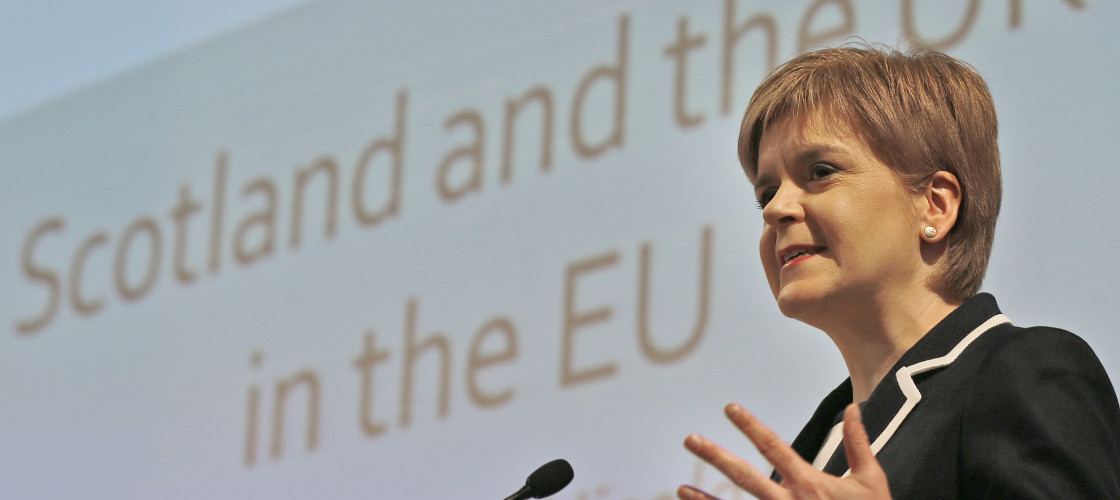Sturgeon’s astonishingly risky EU intervention
 The EU referendum was always going to be a tightrope for Nicola Sturgeon. The risks are manifold: saying something that could ultimately be used against her in future Scottish independence referendum; drawing attention to some of the more unpleasant elements of the independence cause; and appearing to stand shoulder-to-shoulder with the Prime Minister, having previously denounced (and demolished) Labour for doing the same. I always therefore assumed that come the independence referendum Sturgeon, being more risk-averse than her predecessor, would restate her position that she favours British membership of the EU and then stay out of the debate. However, on Monday she delivered a most astonishing speech on Britain’s membership of the European Union – exposing herself to risks on all three fronts identified above, and more.
The EU referendum was always going to be a tightrope for Nicola Sturgeon. The risks are manifold: saying something that could ultimately be used against her in future Scottish independence referendum; drawing attention to some of the more unpleasant elements of the independence cause; and appearing to stand shoulder-to-shoulder with the Prime Minister, having previously denounced (and demolished) Labour for doing the same. I always therefore assumed that come the independence referendum Sturgeon, being more risk-averse than her predecessor, would restate her position that she favours British membership of the EU and then stay out of the debate. However, on Monday she delivered a most astonishing speech on Britain’s membership of the European Union – exposing herself to risks on all three fronts identified above, and more.
She acknowledged, though did not dismiss, the inconsistencies in arguing for a “pooling of sovereignty” with other EU Member States while not applying that same logic mutatis mutandis to the United Kingdom. The submission that “there is nothing at all contradictory about independent nations recognising their interdependence” is so packed with contradiction that only a true-believer could fail to spot it.
In the independence referendum the SNP hoped that we would suspend our better judgement and vote with our hearts, rather than our heads – and dismissed the pleas of those who urged us that we do opposite as cynical and negative. The irony of now making the instrumental case for a political union while dismissing the more emotive, nationalistic case for Brexit is clearly lost on her.
Sturgeon made the case for the EU imposing certain certain social standards on the UK (purportedly) against its will:
“In 2013 the UK only increased the minimum entitlement to parental leave as a direct result of European directives. There are other cases – for example minimum annual leave, and conditions for agency workers – where the UK complies with the European minimum and no more. Which begs the question without European regulations would minimum standards be meet the regulation at all?” [sic]
In other words, it’s OK for the European Union to impose laws on the UK that the UK has not voted for, but it’s not OK for the United Kingdom to impose laws on Scotland that Scotland has not voted for. I wrote previously about how the left was generally fine with surrendering control over the levers of power provided the levers are nonetheless pulled in a manner of their pleasing (such as the internationalisation of human rights). However, pulling the levers of power is the core purpose of the SNP and the independence movement. The SNP didn’t give up its pursuit of independence when Gordon Brown was Prime Minister even though Brown clearly enjoyed overwhelming support in Scotland. The fact that the levers of power were being pulled in a manner Scotland chose mattered not one jot to the SNP – what mattered most was who was pulling the levers of power, not how they are pulled – which is where the contradiction in Sturgeon’s position lies.
She continues:
“In fact, when you consider some of the UK Government’s other policies – for example its attempt to further weaken trade union rights – we should be thankful that the European Union sets some basic social standards.”
The 2015 General Election was remarkable for a number of reasons, though one result seldom commented upon is the fact that right-leaning parties won a majority of the vote for the first time since the war (though it was close in the 1950s). For Sturgeon to claim that we Britons should be thankful to the EU for imposing policies upon us that the people of the UK voted against at the last election, while simultaneously crying foul every time the UK pursues policies which “the people of Scotland did not vote for” is bare-faced hypocrisy, and impossible to credibly sustain. The very nature of a political community is one in which individuals and groups subjugate their own desires to the will of the community. The fact that Sturgeon is apparently OK with the principle of laws being imposed against a nation’s democratic will provided those laws come from Brussels and not London, is a conflict that cannot be resolved without exposing some fairly unpleasant truths about some aspects of Scottish nationalism.
Sturgeon further claimed that
“[t]he European Union is good for the prosperity and wellbeing of individuals, families and communities across our country.”
This is a questionable assertion, but whatever the truth of it in the UK, it is most certainly not the case in Greece, Ireland, Portugal, Spain, or Italy – where the EU has imposed swingeing austerity on these nations, usually against their will, in order to protect (primarily the financial industries of) Germany and France from contagion. How can a party that claims to be “anti-austerity” be so enthusiastically supportive of political institutions that have imposed the harshest austerity Europe has seen since the war? Sturgeon’s narrow, self-interested, view of the beneficiaries of the European Union doesn’t square with her support for a social Europe. I would also ask this question of Jeremy Corbyn and John McDonnell, though their support for the EU is, at least, considerably more tepid. This is a contradiction that Sturgeon conveniently glossed over in her speech.
Sturgeon tail-ended her extraordinary foray into the EU referendum debate with an interview with Channel 4 News. Sturgeon was asked what her supporters might think about her fighting on the same side of a referendum as the Prime Minister. She replied
“[i]f he can appeal to those who agree with him, I’ll appeal to those more inclined to my progressive social democratic view of the European Union – if that maximises the vote to stay in, all the better!”
Substitute “United Kingdom” for “European Union” and that line could as easily have been uttered by Jim Murphy or Johann Lamont.
None of this is explosive, though it certainly provides the SNP’s critics (for what they’re worth) with some ammunition. What’s most remarkable is that such a risky speech is entirely out of character for cautious Nicola Sturgeon. Plenty of other political leaders who have won landslide victories became over-confident. Ultimately, it was their over-confidence that was their undoing.

